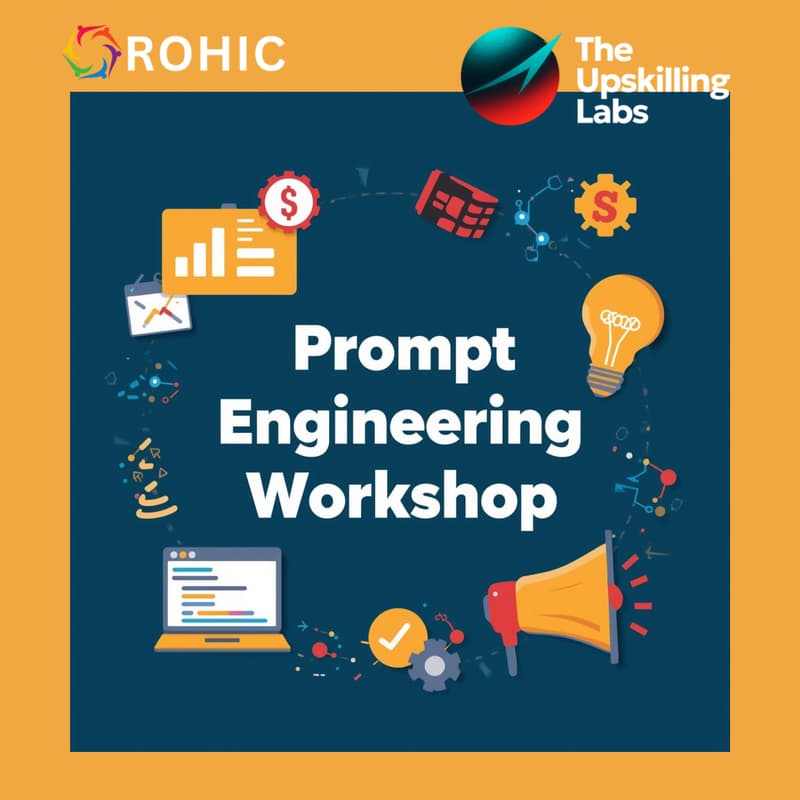

Prompt Engineering Masterclass: From Good Prompts to Reliable Workflows
Learn how to turn vague asks into structured, reliable outputs with modern prompt engineering. In this hands-on masterclass, you’ll learn how to break down tasks, frame effective roles and context, set clear constraints, elicit useful reasoning, and design lightweight “agentic” patterns such as tool calls, retrieval, and review steps.
Prompting has evolved from clever wording into repeatable systems design: structured outputs (JSON Schema), function and tool calling, context engineering for RAG, and built-in verification. With today’s reasoning-class models, simple, explicit instructions often outperform sprawling meta-prompts—and true reliability now depends on clear output schemas, deliberate tool use, and post-generation checks.
By the end of this workshop, you’ll be able to:
Design prompts as systems
Use a prompt specification (objective → inputs → constraints → style → schema → tests) and instruction hierarchy (system developer user) to remove ambiguity and drift. You’ll also learn when to keep prompts short and direct for reasoning-class models.
Guarantee formats with structured outputs
Drive exact JSON Schema responses (dates, enums, arrays) to stop flaky parsing and enable downstream automation. We’ll cover schema design tips, enums vs. anyOf, and graceful failure handling.
Call tools safely with function calling
Bind models to your functions/APIs and design deterministic tool-use prompts (names, arguments, preconditions), including safe parallel tool-use patterns and guardrails.
Engineer context (RAG) that the model can actually use
Apply chunking, re-ranking, and instructional context that reduces hallucinations. You’ll use “cite-and-verify” templates and learn when not to overfill the context window.
Use multimodal prompting (text × image × audio/video)
Attach images and documents with precise, reference-style instructions (for example: “In Figure A, list anomalies ≥ 3%”). Learn modality addressing, grounding, and verbosity control.
Build verification loops that improve trust
Implement patterns such as structured self-checklists, retrieval-based citation checks, and self-consistency sampling when accuracy matters most—and understand when critique loops can hurt performance.
Write security and safety prompts
Design prompt-injection–resistant patterns, use least-privilege tools, and layer content-safety shields aligned with current best practices (e.g., OWASP LLM Top 10–style thinking).
Tune cost and latency with prompt caching
Structure prompts for cache hits, reuse long static headers and examples across calls, and understand provider-specific knobs for performance and cost control.
You’ll leave with:
– A production-ready prompt kit (templates + checklists) you can drop into your workflow.
– A “Prompt QA” checklist for accuracy, tone, safety, and bias.
– Three mini-workflows—write → review → revise, analyze → summarize → decide, and plan → act → report—that you can adapt immediately to your own work or personal projects.
Prerequisites & setup:
– An account for at least one of: OpenAI, Anthropic, or Google AI Studio / Gemini (free or paid is fine).
– A modern browser; optionally Postman or cURL for API demos.
– We provide a small sample dataset (PDF + CSV) and a mock API endpoint for exercises.
Instructor:
Andrew Tsintsiruk (Founder & CEO, Rohic Inc. / Mentor at The Upskilling Labs) — builds collaborative AI agents for go-to-market teams, with a focus on hierarchical orchestration, tool calling, RAG, and human-in-the-loop controls.
Format & logistics:
– Format: Live, hands-on workshop.
– Duration: 1.5–2 hours.
– Recording & materials: Slides, lab notebooks, and all templates are included.
– Capacity: 30–60 participants.